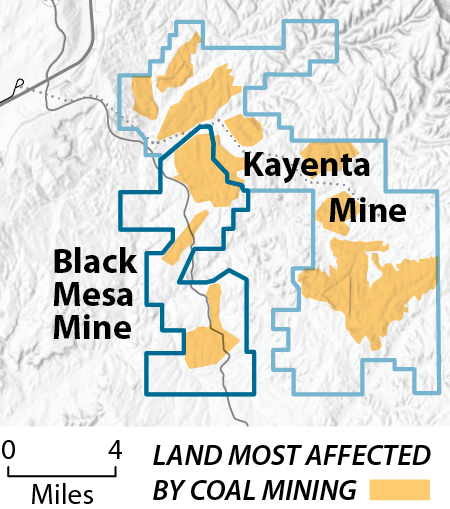Interior Department should review OSMRE’s standards of reclamation and conduct a thorough hydrological study of Black Mesa

Current OSMRE standards are insufficient to ensure coal communities are properly compensated for environmental impacts of coal mining
Key Takeaways:
The U.S. Department of the Interior has failed to hold Peabody Western Coal Company responsible for the effects of its decades-long mining activities in the Black Mesa region of Arizona.
Despite the recent release of reclamation bonds, neither Peabody nor OSMRE have addressed the critical issue of Peabody’s overuse of groundwater in the region.
The validity of the data produced by the USGS and Peabody is questionable, and the DOI should require the completion of a valid, unbiased hydrological study of the Black Mesa.
OSMRE decisions may have been fair decades ago—when the impact of climate change was not so severe—but the standards and expectations of reclamation plans made in the 1990s are unsuitable for the reality of 2023.
July 24, 2023 (IEEFA)— The Office of Surface Mining Reclamation and Enforcement (OSMRE) has failed to hold Peabody Western Coal Company (Peabody) responsible for the impacts of its decades-long mining activities in the Black Mesa region of Arizona, according to a new analysis from the Institute for Energy Economics and Financial Analysis (IEEFA). The analysis outlines the need for the Department of the Interior (DOI) to ensure that Peabody is held accountable for those cleanup requirements.
OSMRE’s mission is to ensure “that the land is restored to beneficial use following mining.” Coal communities across the country depend on OSMRE to protect their interests by holding coal companies accountable for reclaiming land damaged during mining operations. This is often accomplished by OSMRE holding bonds that the companies get back only after they have reclaimed the land to standards set by Surface Mining Control and Regulation Act (SMCRA) and OSMRE. But these standards fail to account for region-specific needs and do not take the ongoing effects of global climate change into consideration at all. As a result, the OSMRE is failing to uphold its responsibility to coal communities like those in the Navajo and Hopi reservations in Arizona.
“The DOI has a trust responsibility to the Indigenous communities of the United States,” said Jennifer Goodman, IEEFA and Grand Canyon Trust research fellow and author of the report. “When OSMRE released Peabody’s bonds without addressing the material damage caused by the company’s violations of reclamation standards, it set a precedent which indicates that such violations are of no consequence and so have no repercussions.”
DOI leadership should review the policies and procedures of OSMRE and adjust its methods accordingly by calling for new environmental impact assessments that take the worsening effects of climate change into consideration. OSMRE decisions may have been fair decades ago—when the impact of climate change was not so apparent and widespread—but the standards and expectations of reclamation plans made in the 1990s are unsuitable for the reality of 2023. The DOI needs to ensure that coal companies are held accountable for their actual impacts on the environment.













